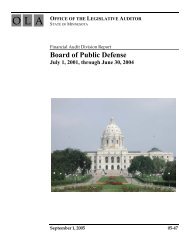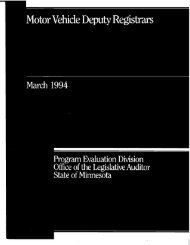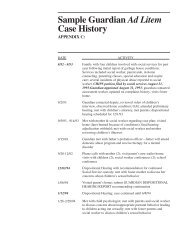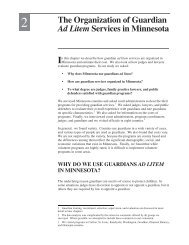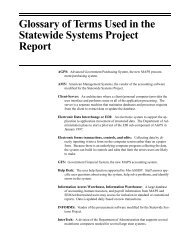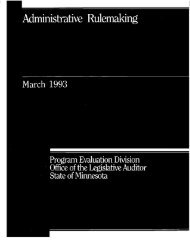Occupational Regulation - Office of the Legislative Auditor
Occupational Regulation - Office of the Legislative Auditor
Occupational Regulation - Office of the Legislative Auditor
Create successful ePaper yourself
Turn your PDF publications into a flip-book with our unique Google optimized e-Paper software.
88 OCCUPATIONAL REGULATION<br />
CPA exam, but have not gained <strong>the</strong> experience necessary to become a licensed<br />
CPA, or those who have been licensed CPAs but have allowed <strong>the</strong>ir license to<br />
lapse. Unlicensed CPAs can use <strong>the</strong> title CPA, but cannot independently practice<br />
public accounting—thus <strong>the</strong> level <strong>of</strong> regulation for unlicensed CPAs is<br />
certification, as <strong>the</strong> term is used nationally. In general, accountants are not<br />
required to be licensed, certified, or registered with <strong>the</strong> board and can practice any<br />
type <strong>of</strong> accounting that does not include public accounting, or performing<br />
independent audits which result in pr<strong>of</strong>essional opinions concerning <strong>the</strong> fairness<br />
<strong>of</strong> a company’s financial statement.<br />
A 1997 bill<br />
proposed to<br />
increase <strong>the</strong><br />
educational<br />
requirement for<br />
CPAs.<br />
There have been two notable legislative proposals involving <strong>the</strong> regulation <strong>of</strong><br />
accountants in recent years. The first coincides with a national campaign by both<br />
<strong>the</strong> American Institute <strong>of</strong> Certified Public Accountants (AICPA) and <strong>the</strong> National<br />
Association <strong>of</strong> State Boards <strong>of</strong> Accountancy (NASBA). It proposes to increase<br />
<strong>the</strong> educational requirements for a CPA from a high school diploma to 150<br />
undergraduate credit hours, which is five years <strong>of</strong> post secondary education.<br />
Forty-four states have implemented <strong>the</strong> 150 hour requirement. Although <strong>the</strong><br />
campaign began in <strong>the</strong> early 1990s and has <strong>the</strong> support <strong>of</strong> both <strong>the</strong> Minnesota<br />
Society <strong>of</strong> Certified Public Accountants and <strong>the</strong> state Board <strong>of</strong> Accountancy, this<br />
change has not yet won approval from <strong>the</strong> Minnesota Legislature. The proposal<br />
has faced opposition from several groups including state community colleges<br />
<strong>of</strong>fering two-year degrees in accounting. The two-year programs fear that <strong>the</strong> 150<br />
hour requirement would divert students from <strong>the</strong>ir programs to colleges and<br />
universities <strong>of</strong>fering <strong>the</strong> full program. They also argue that <strong>the</strong> added expenses<br />
associated with attending a five-year program would unnecessarily exclude poor<br />
and minority students from <strong>the</strong> pr<strong>of</strong>ession. In recent hearings legislators have<br />
tested <strong>the</strong> proposal against a Chapter 214 criterion by asking whe<strong>the</strong>r <strong>the</strong> proposed<br />
changes would actually protect <strong>the</strong> public. While sponsors <strong>of</strong> <strong>the</strong> proposal argue<br />
that <strong>the</strong> 150 hour rule would improve public protection against certain risks, most<br />
<strong>of</strong> <strong>the</strong>ir arguments have to do with bringing <strong>the</strong> standards for public accounting in<br />
Minnesota in line with <strong>the</strong> standards in o<strong>the</strong>r states. In 1997, H.F. 301 and S.F.<br />
239 were passed out <strong>of</strong> <strong>the</strong> Commerce Committee <strong>of</strong> both chambers and <strong>the</strong>n<br />
referred to <strong>the</strong> respective education committees, where <strong>the</strong> bills were stalled.<br />
The second notable legislative development occurred in 1998 when <strong>the</strong> legislature<br />
passed H.F. 2308/S.F. 2014, a bill that broadens <strong>the</strong> disciplinary capabilities <strong>of</strong> <strong>the</strong><br />
Board <strong>of</strong> Accountancy. The board is now able to discipline accountants who are<br />
not licensed or certified as CPAs or LPAs. It is too early to measure <strong>the</strong> extent to<br />
which this will affect <strong>the</strong> practice <strong>of</strong> accountancy. In Minnesota this model <strong>of</strong><br />
regulation has been used to regulate unlicensed mental health practitioners since<br />
1996, with some success.<br />
In sum, <strong>the</strong> title certified public accountant is a good example <strong>of</strong> <strong>the</strong> confusing<br />
terminology that can be found in occupational regulation. Since this title is used<br />
nationally it is unlikely to change. Legislators are likely to face ongoing pressure<br />
to raise <strong>the</strong> educational requirements for a CPA to 150 credit hours as <strong>the</strong> AICPA<br />
and NASBA continue to press nationally for this and o<strong>the</strong>r aspects <strong>of</strong> <strong>the</strong>ir model<br />
Uniform Accountancy Act. The Minnesota Legislature’s resistance to this<br />
campaign can be seen as a successful application <strong>of</strong> Chapter 214, which requires<br />
consideration <strong>of</strong> “[w]he<strong>the</strong>r <strong>the</strong> unregulated practice <strong>of</strong> an occupation may harm<br />
or endanger <strong>the</strong> health, safety, and welfare <strong>of</strong> citizens <strong>of</strong> <strong>the</strong> state and whe<strong>the</strong>r <strong>the</strong><br />
potential for harm is recognizable and not remote.” However, it may be that



